From The Eastern Door by Marcus Bankuti December 20 2024
Brooklyn Leblanc hunkered down with many other people to stand up for Kanien’kehá:ka sovereignty in what became known as the Oka Crisis.
“I fought from beginning to end in 1990, in the forest every night,” he said.
Now 73 years old and facing charges of conspiracy and fraud for his engagement in the tobacco trade, he was no less ready for a fight, even as his lawyer told him he could have pled guilty for a slap on the wrist.
“If you’re going to believe in something, you can’t do it halfway,” said Leblanc. “You’ve got to believe all the way, and I always believed in this place, and I believe that our business is legal, and it is.”
But the fight ended before it even began. For the first time, another huge tobacco case was used to win the day and secure a successful motion to acquit before trial.
The precedent-setting case by Kahnawa’kehró:non Derek White and Hunter Montour last year was applied in this case, proving the magnitude of what White and Hunter accomplished.
“When they won, they won for everybody that’s in the tobacco industry,” said Leblanc. “People need to realize the victory they got, that’s why we got off, because the precedent was already there.”
He noted that White spent millions of dollars and the better part of a decade fighting for the recognition of treaty rights.
“What Derek and Hunter won affects the whole town here, and we’re the first ones to prove it,” said Leblanc, who was acquitted alongside his Onkwehón:we co-accused – Logan Kane, Christina Williams, Theoriwathe Beauvais, and Cody Raven Jacobs.
“We don’t live by their tobacco rules,” said Leblanc. “They had it for 150 years. Now it’s our turn. They want taxes, and it’s never going to happen here.”
Even recognizing the importance of the White-Montour decision, Leblanc was skeptical, to say the least, when his lawyer, Julio Péris, approached him with the idea of a motion to acquit before trial.
“I didn’t think we had a chance in hell,” Leblanc said. But his lawyer’s confidence was borne out.
In his decision on the motion on Wednesday, Quebec Superior Court judge Daniel Royer affirmed his obligation to follow jurisprudence set last year in a ruling from Judge Sophie Bourque, which created a new standard for the consideration of treaty rights, even as that decision faces appeal by Quebec.
White and Montour were arrested in 2016 as part of Project Mygale, a large-scale, international investigation into cross-border tobacco trading, which the government characterized as smuggling.
In 2019, White was acquitted of defrauding Quebec out of more than $40 million in excise taxes but was found guilty of conspiracy to commit fraud and profiting from organized crime, with Montour deemed guilty of aiding organized crime.
However, Bourque’s judgment on a constitutional challenge issued a permanent stay of proceedings based on an analysis of historical treaties that she said affirmed the pair’s right to trade tobacco.
Royer also explicitly rejected the argument of the attorneys general of Quebec and Canada that the White-Montour decision should be viewed as an isolated one.
“It would be more accurate to say that it is the only decision in the issue,” reads Royer’s judgment.
Leblanc believes the fact this precedent has been applied in a second case will make the authorities think twice before pursuing Kanien’kehá:ka tobacco traders again, considering the resources wasted on a complicated investigation that included surveillance.
White, who was keeping tabs on the case, was not surprised that the defendants in the Leblanc case were spared a trial, but he was impressed by the directness of Royer’s ruling.
“I knew they were going to either throw it out or basically delay it until my appeal went through,” said White. “But the judge ended up going straight to the point with the White-Montour case. Basically, they threw it out of court, not threw it out, but actually, our people won.”
To White, it’s a validation of his choice to dig in his heels when he faced his own charges under the Excise Act, essentially tax legislation – the same law used to charge Leblanc and the others.
“I knew what I fought for the last seven years, it would have helped everybody out,” White said. “At the end of my case, we saw that it was historic. It’s going to help everybody across the board, not just tobacco. It’s everything else.”
And while it is expected that the Leblanc acquittal will be appealed by the government, much like the White-Montour case, the significance of the decision being used in another case is clear.
“They can all thank Derek, because Derek was the first one to do it, to pay all those attorney fees for years, and it’s really a success for everybody else,” said Pierre L’Ecuyer, who represented Williams in this case and who represented White in his criminal trial.
The facts in this case were very similar, he said, leading to the decision to move ahead with a motion to acquit before trial, which he described as unusual.
“It’s exactly the same fact that because of the old treaties, Native people from Kahnawake are allowed to trade tobacco, so it applied,” he said.
Bourque cited the Covenant Chain, 10 treaties negotiated between 1664 and 1760, which the judge recognized as a kind of “meta-treaty” with the Haudenosaunee that guarantees tobacco trading rights for the Mohawks of Kahnawake.
While the attorneys general for the government argued the precedent should not apply because it is being appealed, Royer rejected this position outright, saying a losing party cannot undermine a judgement simply by appealing it.
The acquittal of Leblanc and the others was not only a milestone for the recognition of Haudenosaunee treaty rights, but also a relief for the defendants.
“It’s a very nice Christmas for our clients,” L’Ecuyer said. He predicted a “100 percent” chance of appeal; the case will be tied to the fate of White-Montour, which is currently at the Quebec Court of Appeal but will probably not be heard for years.
In an interview with The Eastern Door, Leblanc repeatedly emphasized the importance of the White-Montour verdict, imploring his fellow Kahnawa’kehró:non to understand the weight of that victory.
“What they accomplished was good for the whole of Kahnawake, not just them,” he said.
“They fought it.”
marcus@easterndoor.com
Marcus Bankuti, Local Journalism Initiative Reporter

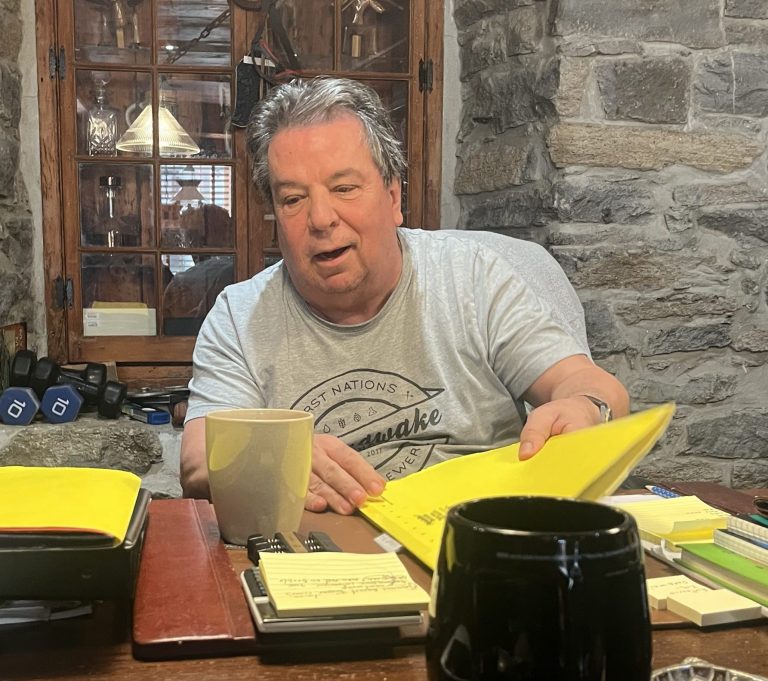
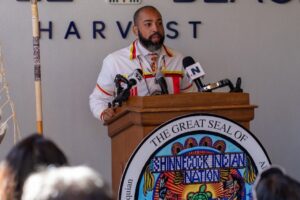

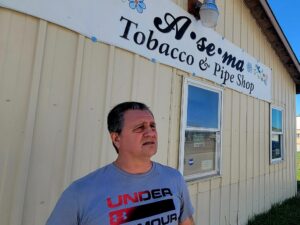




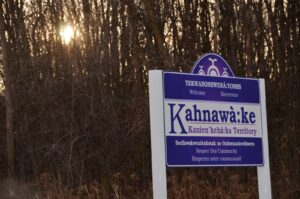





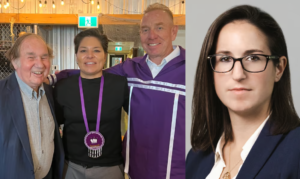

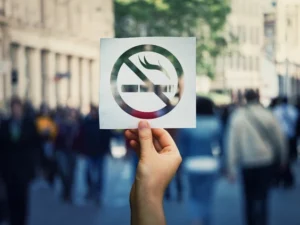
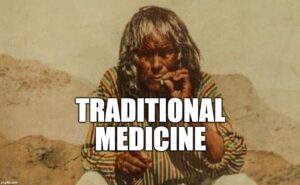
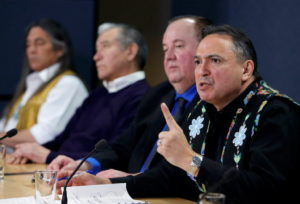
Comments are closed.